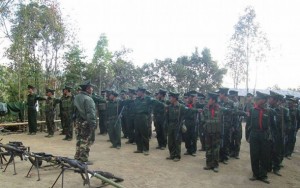More Clashes, More Talks, No Protection
By Burma Partnership • August 31, 2015 As talks over the signing of a nationwide ceasefire agreement (NCA) continue, with another meeting planned for later this month, the Burma Army continues to attack various ethnic armed organizations (EAOs) in Kachin, Palaung, Shan and Karen areas, casting doubt on the dominant narrative of optimism that surrounds the NCA. Meanwhile, as has always been the case, it is civilians and local communities who are bearing the brunt of the war, with their protection glaringly absent in the ceasefire discourse.
As talks over the signing of a nationwide ceasefire agreement (NCA) continue, with another meeting planned for later this month, the Burma Army continues to attack various ethnic armed organizations (EAOs) in Kachin, Palaung, Shan and Karen areas, casting doubt on the dominant narrative of optimism that surrounds the NCA. Meanwhile, as has always been the case, it is civilians and local communities who are bearing the brunt of the war, with their protection glaringly absent in the ceasefire discourse.
Five senior members of the most prominent EAOs will travel to Naypyidaw later in September to meet with President Thein Sein and Burma Army chief, Min Aung Hlaing. The issue of inclusivity remains the biggest stumbling block and despite confidence from the Government that the date to sign the NCA will be set at this meeting, the Government’s continued insistence that six groups will not be part of the signing of the NCA is stalling the process. As Padoh Naw Zipporah Sein, Chairperson of the Senior Delegation, the lead negotiating team from the EAOs side stated referring to exclusion of key groups; “If the Burma Army and the Government do not want them to participate, or if the army continues fighting them, the signing of an NCA will not have meaning.” Daw Aung San Suu Kyi in an interview with Radio Free Asia, also emphasized the importance of inclusivity; “We wish this to happen soon, we want it to be all-inclusive and we want a treaty where every party takes responsibility so that our country can move toward peace.”
Yet as the two sides disagree on inclusivity, attacks on the ground are ongoing. Reports have emerged of clashes within the past week between the Burma Army and the Kachin Independence Army (KIA), the Shan State Army South (RCSS), the Ta’ang National Liberation Army (TNLA), and of an unspecified EAO in Karen State. These realities on the ground jar with the Governments rhetoric. As the Government’s main negotiator, Minister Aung Min, was speaking to Parliament about how fighting has reduced in recent years, the words coming from Burma Army soldiers on the ground is violent and threatening as officers told Palaung communities that they would “destroy” the TNLA, like they did the ethnic Kokang, Myanmar National Democratic Alliance Army (MNDAA).
With these ongoing attacks from Burma Army against EAOs, communities on the ground continue to suffer. After the clashes with the RCSS, seven villagers were detained by the Burma Army for more than a day, continuing a decades-long pattern that invokes fear in communities. These detentions regularly lead to violence, as explained by Sai Hor Song of the Shan Human Rights Foundation, “When there was fighting in local areas the Burma Army would allege that villagers were involved in assisting the Shan Army. In many cases [of detention] the Burma Army forced the villagers to be their porters and tortured or even killed them.”
Tags: Burma Partership, Daw Aung San Suu Kyi, Ethnic Armed Organizations, Kachin Independence Army, Karen State, Myanmar National Democratic Alliance Army, Nationwide Ceasefire Agreement, Padoh Naw Zipporah Sein, Shan State Army-South, Ta'ang National Liberation ArmyThis post is in: Blog
Related Posts56 Solidarity Groups Worldwide Call for an Immediate End to Offensives in Northern Burma/Myanmar and for the Provision of Unhindered Humanitarian Assistance to the IDPs
Meaningful Dialogue on the National Education Law is the Burma Government’s Obligation
More Murders, Same Patterns as Burma Army Acts with Impunity
The Facts are Plain and Stated. It is Time to Act!









 All posts
All posts